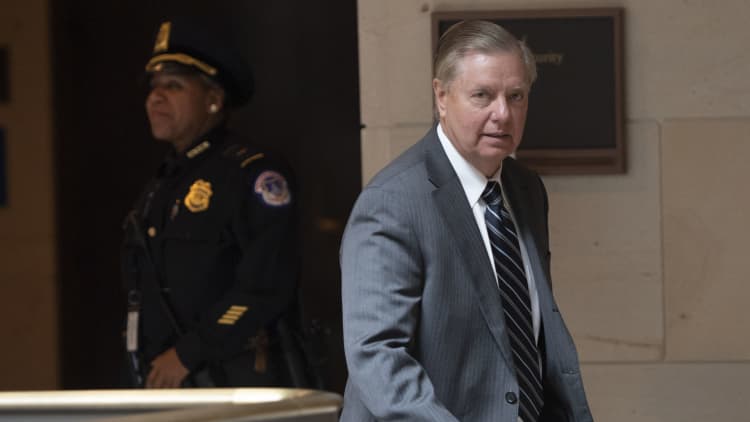The U.S. Senate plans a vote on Yemen this week, and not everyone in Washington is happy about it.
The State Department reiterated its frustration Sunday with Senate moves to cut U.S. support for the Saudi-led offensive in Yemen, where more than three years of civil war and external intervention have created what the United Nations says is the world's worst humanitarian crisis.
Speaking at the UAE security forum in Abu Dhabi, Deputy Assistant Secretary for Gulf Affairs Timothy Lenderking expressed his concern over the Senate vote, which is due this week. The vote represents an unprecedented effort to invoke Congress's war powers to end U.S. activity that was started under the Obama administration without the authorization of Congress.
"Obviously there are pressures in our system … to either withdraw from the conflict or discontinue our support of the coalition, which we are strongly opposed to on the administration side," Lenderking said. "We do believe that the support for the coalition is necessary. It sends a wrong message if we discontinue our support."
If the U.S. stops supplying munitions I would expect Saudi Arabia to increase purchases from Britain and France, and to look for more Chinese and Russian systems...Jack Watlingresearch fellow for land warfare, Royal United Services Institute
The message Lenderking and his White House counterparts fear is one they say would empower Iran, Saudi Arabia's regional arch-rival and the backer of Yemen's Houthi rebels, who took over the country's capital of Sanaa in late 2014. Weakening Iran, which the administration accuses of malign and destabilizing activity across the Middle East from Syria and Yemen to Lebanon and Iraq, is a pillar of U.S. President Donald Trump's foreign policy.
The bipartisan resolution, sponsored by Mike Lee (R-Utah) and Bernie Sanders (I-Vt.), calls for ending U.S. refueling of Saudi fighter jets and withdrawing U.S. military presence from the area, among other demands. Support for ending involvement in Yemen, which has gained ground in recent months, is at an all-time high amid anger over the murder of Saudi journalist Jamal Khashoggi, which lawmakers and U.S. intelligence believe was directed by Saudi Crown Prince Mohammed bin Salman.
Saudi officials did not immediately respond to CNBC's request for comment.
USA 'will bear responsibility'
The Trump administration, which sees Saudi Arabia as vital to its Middle East strategy, says supporting the predominantly Saudi and Emirati coalition is crucial to containing Iran and achieving an end to the war. Yemeni government officials and Houthi representatives are currently in Sweden for fragile U.N.-brokered peace talks, all previous efforts of which have collapsed.
But mounting international criticism over protracted fighting that has killed tens of thousands and pushed some 14 million Yemenis to the brink of starvation is putting more pressure on the administration than ever before. In a strongly-worded statement last week, the heads of five international aid organizations wrote that "if it does not cease its military support for the Saudi/UAE coalition, the United States, too, will bear responsibility for what may be the largest famine in decades."

In November, 14 Senate Republicans joined all the chamber's Democrats to advance the Sanders-Lee resolution.
"Our involvement in this terrible war is one thing that engenders more terrorism," Rand Paul (R-Ky.) told NBC on Sunday. "I think it's actually a risk to our national security to be involved with the Saudis."
Bruce Riedel, a 29-year CIA veteran and senior fellow at the Brookings Institution, agrees.
"A Senate vote to halt U.S. assistance to the Saudi and Emirati war in Yemen by invoking the War Powers Act is long overdue," he told CNBC on Monday. An expert in counter-terrorism, Riedel has advised four presidents on Middle East and South Asian affairs.
"While a vote this month would be primarily symbolic," he said, "it will also be an unprecedented step to stop the worst humanitarian catastrophe of our time. Next year the new Congress can take more concrete action to stop the war."
'Potent partisan weapon'
But the resolution isn't likely to change U.S. military policy in the region and its partnership with Saudi Arabia, according to Jack Watling, research fellow for land warfare at the Royal United Services Institute in London.
"The administration views Saudi Arabia and the UAE as vital strategic allies; if Congress tries to contain assistance to their operations in Yemen, I would expect missions to be undertaken as counter-terrorism operations, or on other pretexts," Watling told CNBC.
The resolution is accompanied by separate bipartisan legislation aimed at suspending U.S. weapons sales to Saudi Arabia, which is Washington's biggest arms buyer. This will have a hard time passing, given that the Senate will likely not have the numbers to produce a veto-proof majority to override the expected veto from President Trump.
Watling also pointed out that Riyadh can always turn to other countries for its weaponry.
"If the U.S. stops supplying munitions I would expect Saudi Arabia to increase purchases from Britain and France, and to look for more Chinese and Russian systems, including the S400 and HQ-9 missiles."
Hussein Ibish, a senior resident scholar at the Arab Gulf States Institute in Washington, warned that with more Democrats in Congress next year, the Saudis will face serious challenges.
"I don't think the structural aspects of U.S.-Saudi relations are at risk," he said, pointing to what he considered constants such as energy cooperation, counter-terrorism operations, military ties and intelligence sharing. "But I think there's a long-term threat."
"Right now Saudi Arabia has become a potent partisan weapon that can be deployed, and it could be deployed next year to powerful ends. Now it's inevitable that 2019 is going to be a terribly bad year for Saudi Arabia in Washington."


